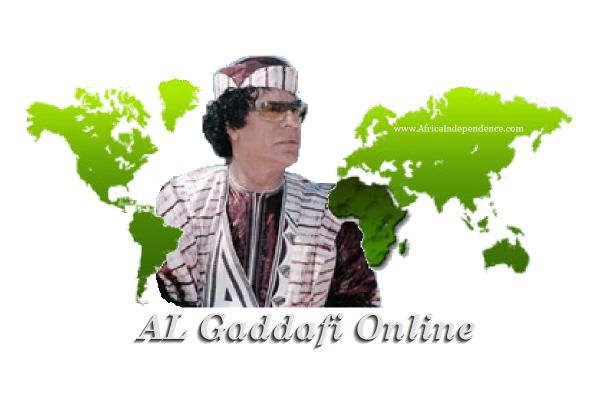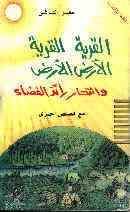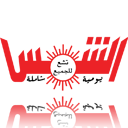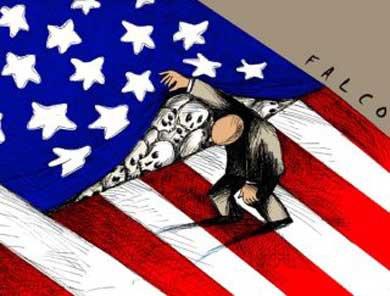Contents
CAMPAIGN AGAINST
LIBYA: Historical Background
In order to clarify the
background of the crisis, we must go back to forgotten files on the
American-Libyan conflict in particular, and the conflict of America
with the countries of the Arab Maghreb in general. In May, 1784,
the U.S. Congress set up an ad hoc committee composed of Benjamin
Franklin, John Adams, and Thomas Jefferson, (who later became U.S.
Presidents), to negotiate an agreement with the North African
countries. In 1786, the Committee succeeded in concluding an
agreement with Morocco by virtue of which the United States would
pay several thousands of dollars as dues to that country for the
protection of American commercial ships against pirates. However,
the Committee failed to conclude similar agreements with Algeria
and Libya. Adams proposed to increase the dues to be paid to
Algeria and Libya, but Jefferson suggested that, instead, such
funds be disbursed for the setting up of a military force to
protect American ships.
In January, 1791, the
Committee of the Congress which dealt with trade problems in the
Mediterranean, approved the proposal of Jefferson, who was then
Secretary of State, to constitute a naval armed force. In March
,1794, the U.S. Congress authorized the American Government to
build six military ships to be used against Libya and Algeria. This
was the first American fleet, which still exists in the
Mediterranean under the name "the Sixth Fleet".
On the 4th of November, 1796,
an agreement was concluded between the United States and Libya by
virtue of which the United States would pay Libya $56 thousand. In
August, 1797, another agreement was concluded with Tunisia for US
$107 thousand. When the naval units were constructed, however, the
United States reneged on the agreements and the North African
countries expressed immediate objections.
In 1801, the United
States declared war against Libya, its first declaration of war
after independence from Great Britain. On the basis of this
declaration of war, the United States sent four of its military
ships to the Mediterranean under the command of Commander Richard
Dahl, the first Commander of the First American Fleet in the
Mediterranean. The failure of his attack on Tripoli was the first
American military defeat
in the Mediterranean and compelled Dahl to
retreat to Gibraltar. He was replaced by Commander Richard Morris
who besieged Tripoli in June, 1802. However the Algerian and
Moroccan naval forces sailed against him and compelled him to
retreat. He renewed his siege in May, 1803, but had to retreat
again in September of the same year. His successors, Commanders
Edward Brill and Samuel Baron also failed to secure a victory.
Despite this defeat and the failure of the invasion of Libya it is
ironic that this military operation is now considered a glorious
victory of the United States' Navy. To this day, the anthem of the
American Naval forces chants of their victories: "...from the
halls of Montezuma to the walls of Tripoli..."
This anthem clearly
represents an unbroken link between what occurred two centuries ago
and what is taking place today. Libya still remains in the mind of
American soldiers a hateful enemy which must be vanquished and
destroyed. The American and Western attitude toward the Arab and
Muslim peoples remains one of disdain and scorn that easily
escalates to racial discrimination and outright
hostility.
The new Western imperialist
campaign thus has a clear historical basis reaching back over two
hundred years, but the campaign had been particularly expected over
the past two decades. In September 1969, The Al-Fateh revolution
launched its revolutionary achievements by dismantling British and
American military bases in Libya. The Revolution eradicated the
cancerous Western ascendancy over the Libyan society, toppled the
despotic monarchy, lent support to national liberation movements in
all Islamic and Third World countries, recovered national resources
from foreign exploitation and hegemony, and devoted such resources
to securing autonomous development and the advancement of progress.
In the wake of this, there was immediate expectation of American
imperialist retaliation.
This American retaliation
against Libya gained full force in the early 80s, with the
beginning of the "Reagan era" which revived the policy of direct
interference and the role of the U.S. as World policeman which had
prevailed in the 5Os and 60s, and subsided only after the infamous
defeat in Vietnam
In this period there are
important historical political landmarks that are
noteworthy:
- In June, 1984, The
Study and Research Section of the U.S. State Department drew up
Report No. 110 entitled "The Libyan Question" which emphasized the
contrary role played by Libya against American policies and against
what the report referred to as "American interests in the Arab
World and Africa".
The report focused on the role of Colonel
Moammar Qaddafi in impeding American initiatives for a political
settlement in the Middle East, starting with the Camp David Accord
in 1979 and ending with the initiative of President Reagan in 1982.
The report also addressed the Libyan support of forces hostile to
the United States in Central and Latin America, and the danger that
such support directly posed to the strategic security of the United
States.
The report stated that since
the evacuation of the American forces from the Wheelis base on the
11th of June, 1970, American control over Libyan political
decisions had ceased to exist. The report suggested that measures
be taken to restore American influence in order to safeguard the
interests of the United States and the interests of its allies in
the region and elsewhere in Africa and Latin America.
- In September, 1985, "The
National Security Centre" drew up a report entitled "The Principle
of Qaddafi." This report explained that Libyan interests ran
counter to those of the United States and that Libyan policies
"pose a danger to American security and to NATO plans" and even to
some Arab countries friendly to the United States. The report added
that if it was not possible to shoot Qaddafi, "an operation must be
worked out against him with accuracy never before encountered by
Libya since the toppling of the monarchy in September
1969."
- On the 13th of January,
1988, the American magazine "Newsweek" published an article
entitled "Six Strategic Points," referring to the six points
outlined by a second ranking official at the National Security
Council and endorsed by that Council. These were the
following:
- Project President Qaddafi as
a negative personality on the international scene, and slander him
so as to create a public opinion within the United States and at
the world level that would support any American project hostile to
him.
- Continue the persistent
demand that the Western allies oppose Libya at political, economic,
and military levels.
- Threaten to boycott the
countries which refuse to boycott Libya even if that boycott
involves the cessation of American military transaction with some
allies such as France and Belgium.
- Mobilize all forces hostile
to Colonel Qaddafi, and finance, equip, and encourage his
enemies.
- Invite all the countries of
the world to exercise a strict control over Libyan diplomats, even
if it involves the violation of their diplomatic
immunity.
- Organize a military
operation against Libya.
- On November 3, 1985, an
article appeared "The Washington Post", written by Bob Woodward,
the journalist who revealed the Watergate scandal in l972 which
brought about the resignation of President Nixon. This article
contained information on a report drawn up by the CIA stating that
President Reagan had empowered the CIA to implement a secret
operation to destroy the Libyan regime headed by Colonel Qaddafi
and that the plan included providing assistance to other countries
in North Africa and the Middle East. On March 30, 1986, the
Egyptian newspaper "Al Ahram" published an article stating that the
United States had three times asked Egypt to wage a military action
against Libya but that Egypt had refused to do so.
The relevant American
departments persistently tried to goad Colonel Qaddafi into a
reckless external action or into concocting a terrorist act to
enable his enemies to seize power, or to give one of Libya's
neighbours "Algeria or Egypt for example" justification to
retaliate forcefully against Libya. The paper affirms that this
plan was submitted to the external Relations Committee of the
Congress and that both George Schultz, the Secretary of State, and
William Casey, the CIA Director, had stated that they were seeking
the approval of Congress. The real objective, according to the
paper, was to "impose changes that could be sustained in Libyan
policies."
The changes that
could be sustained were attempted through
the CIA primarily by
impairing the relations of Libya with Arab
countries
at
first and later, with friendly countries. As a first step, all
Libyan initiations to create a union with the Arab Mashrek or
Maghreb were aborted.
Libyan-Egyptian relations were disrupted
to the extent of an aggression by Sadat against the Jamahiriya in
1977.
This was
followed by a plot to strike at the relations of Libya with the
Sudan and then Algeria. Even the Understanding Agreement of Libya
with France regarding Chad signed on September 17, 1984, was
impeded by the United States who undermined it shortly after the
meeting of Qaddafi with Francois Mitterrand. When all such
manoeuvres failed to impose "sustained changes," terrorist units
were trained in the Sudan by the ClA. These units arrived in
Tripoli but failed to achieve their purpose and their paymasters
and provokers were uncovered. Assassination then became the new
tool.
There was
an attempt to assassinate Moammar Qaddafi in 1984,
but the conspirators were apprehended and they revealed the role
played by the CIA in the attempt.
The major American
attempt to stifle Al-Fateh revolution was that of 1986, namely the
military aggression waged by hundreds of planes against Tripoli,
Benghazi and the residence of the Leader of the Revolution, Moammar
Qaddafi. Residential areas were bombed in a deluded attempt to
terrorize Libyan citizens and goad them into ridding themselves of
their revolutionary leadership.
The argument of the
American Administration for this blatant aggression was that Libya
was responsible for a terrorist act against a Berlin night-club
which killed one American and wounded others. Washington persisted
in its claim that Libya was responsible for the Berlin incident and
provided its European allies with what it alleged to be conclusive
proof. Based on this, the United States started a far-reaching
campaign to mobilize Western and American public opinion and set
its allies against Libya.
After the collapse of East
Germany and the seizure of the files of German intelligence, it was
revealed that the blowing up of the night-club was planned by the
East German Intelligence Service in cooperation with the German
Organization of the Red Brigade. It was reaffirmed by Herr Wolf,
the head of the Intelligence Service, when he was apprehended and
questioned by (West) German and American intelligence. This
information, which would have exonerated Libya, was kept secret,
not only because America wished to protect its "credibility", but
also because it wished to persist in its schemes against
Libya.
America, ultimately, did
succeed in its attempts at portraying Libya as the leader of the
forces hostile to the West and a dangerous supporter of liberation
movements in the Third World. It imposed collective political and
economic sanctions on Libya and managed to rally the support of
some States for its military aggression, including Britain, Spain,
France, and Italy.
In 1989, when George Bush
became President after Ronald Reagan, the Libyan diplomacy
earnestly sought to open a new page of relations between Washington
and Tripoli, on the basis of a principle of balanced relations
between states, and laying the blame for the aggression against
Libya on President Reagan and his Administration alone.
But this Libyan
initiative was repulsed by Washington and its European allies, and
the accusations and plots against the Libya continued. It became
clear that the campaign against Libya was not the result of the
will of particular leaders but was firmly entrenched in the world
view of the imperialist Western nations.
In 1990, the campaign of
these nations against Libya took a new turn, in the form of
allegations of the existence of a chemical arms factory at the
village of Al-Rabita. They persisted in their allegations, although
the Libyan authorities and the European firms which had set up the
factory firmly stated that it was a pharmaceutical factory for
chemical products.
The Libyan diplomacy
succeeded in aborting this new campaign by inviting Arab and
foreign delegations, composed of journalists, politicians, and
members of parliament to visit the factory and verify its equipment
and production. These delegations were headed by President Hosni
Mubarack of Egypt. Each and every visitor unequivocally stated that
the American allegations were unfounded. Yet, early in 1991, an
unknown arsonist set fire to the factory. The arson allowed the
Western nations to stick to their accusations and claim that the
fire was an attempt to cover up the truth.
During the incident of the
Rabita factory, the alleged purchase by Libya of 25 000 tons of
Semtex from Czechoslovakia was raised. This material is known to be
used for lethal explosives and plastic bombs. The new
Czechoslovakian officials said that Libya had bought 2 500 Kg (2.5
tons) of Semtex, but in the pursuance of its slanderous plan, the
United States enhanced that figure to 25 000 tons to prove that
Libya had bought an astronomical quantity beyond its real needs and
that it must, therefore have links to terrorist organizations
throughout the world.
In October, 1990,
in the German magazine "der Spiegel", the Leader, Moammar Qaddafi
related his side of the story. He said that he had called the new
Czechoslovakian President, Vlatislav Havel, and asked him to
clarify the situation and deny the lies disseminated by America.
Havel replied that he had issued an official denial without being
asked to do so, but the denial had not been published. He then
issued another denial, but the Western media did not even refer to
it.











